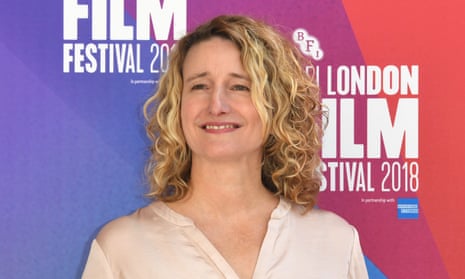The London film festival (LFF) is aiming to create a “special festival moment” to “to celebrate the enormous contribution women make to the film industry”: a group photograph of female film industry professionals that will coincide with the one-year anniversary of the #MeToo campaign and its impact on the film industry. It is inspired by the silent protest led by Cate Blanchett on the red carpet at the Cannes film festival in May.
The event will take place at the BFI Southbank on 12 October. The festival expects around 70 participants, with Colette star Keira Knightley and Mandy’s Andrea Riseborough likely to be among them.
The Cannes protest took place against a backdrop of roiling discontent about the treatment of women in the industry in general and at Cannes in particular. The LFF has included a significant number of female film-makers in this year’s lineup. The festival has programmed 149 films with female directors, or 38% of its total. Five of the 11 directors in the festival’s main competition are women. Cannes managed a mere three out of 21, while the Venice film festival, in September, mustered only a single female director from a similarly sized competition.
Part of London’s motivation, says critic and screenwriter Kate Muir, is that most of its lead team are women. For the 2018 edition, Tricia Tuttle (the deputy head of festivals) is this year’s interim artistic director while Clare Stewart, the BFI’s head of festivals, is on sabbatical; and two of the three chief programmers are women. Muir, who is chief mentor of the festival’s new critics’ mentorship programme, says: “The male-run Cannes and Venice festivals have only paid lip service to the #MeToo movement, signing equality pledges but keeping their testosterone-packed programmes, while the female-run LFF has made a conscious effort to find female and diverse voices.”
Tuttle says the festival is providing a necessary corrective in the domestic film industry. “In the UK, only 11% of [top-grossing] films are directed by women, and that figure declines sharply as the budgets rise. While we didn’t set out with quotas, we’re all acutely aware of this long-term and frankly unacceptable gender imbalance. The industry has to work collectively to change that. We’re well-positioned to take risks, and it’s a key part of our job to find and champion new film-makers.”
She is also aware that one festival alone won’t transform the industry overnight. “I’m not sure LFF will have an impact on other festivals’ curatorial approach, but the sustained frustration of the press and industry will. When some festivals are programming great work by female film-makers and moving closing to gender parity, it becomes harder to defend the idea that the work just isn’t out there.”
Muir points out the battle for equal representation is far from won. “The fact is that, while the competition strand is 50% female, the London film festival’s mainstream gala premieres are mostly directed by men. It’s up to festivals to open the doors to those new voices so they can rise up.”
However the fact remains that, despite its lead on #MeToo and Time’s Up, London still lacks the clout of other major European festivals in securing high-profile world premieres, one of the most prized indicators of a festival’s status. Earlier this week, the Hollywood Reporter, an influential trade magazine, described London as a “secondary” festival. It may be showing films by the Coen brothers Steve McQueen and Yorgos Lanthimos, with stars such as Rosamund Pike, Viola Davis and Timothée Chalamet, but they have already screened at other festivals. Still, London’s only high-profile world premiere is a pretty decent one: Stan and Ollie, starring Steve Coogan and John C Reilly as the celebrated comic duo Laurel and Hardy.
Tuttle says the LFF’s priority is to give audiences, rather than critics and industry insiders, full value. “I’m not going to say that the right world premiere in the right spot is not important for the festival … but this is not the driver of our programming strategy. We’re an audience festival, and offering cinematic breadth, diversity, quality – that’s what it’s all about.
Muir says many major players visit the festival to present their films to audiences. “London is also full of Bafta and Oscar voters, and the LFF shines a spotlight that affects the all-important awards’ race.” As films start to jostle for position over the next month or two – Bafta voting begins on 14 December, the Oscars on 7 January – London offers a platform for film-makers to pitch both to awards voters and paying audiences.
The BFI London film festival runs until 21 October.
